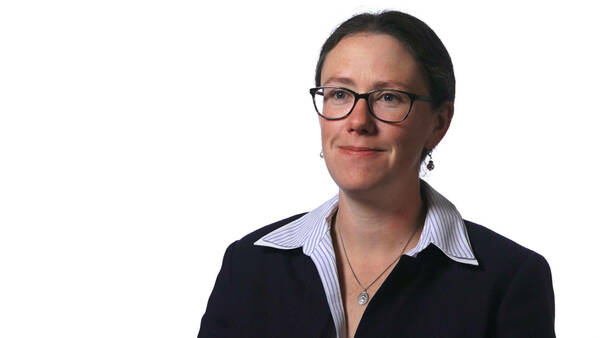
“I’m interested in treating all time biases the same, offering a rational theory that explains exactly how time should figure into our planning.”
— Meghan Sullivan
Meghan Sullivan is the Rev. John A. O’Brien Collegiate Associate Professor of Philosophy at the University of Notre Dame. Her areas of research interest include metaphysics, philosophical logic, and philosophy of religion. More information can be found at Meghan Sullivan’s faculty page.
Video Transcript
I work on philosophy of time. Right now, I’m writing a book about time biases, how our assumptions about time factor into our preferences about how our lives go.
So one kind of time bias that’s really familiar to us is near bias. We all care a lot more about events that are happening sooner rather than events that are happening later. Philosophers, psychologists, economists cite near bias as a reason why people don’t save enough for their retirements, why we don’t stop smoking, why we refuse to exercise—something about thinking about the really distant future is hard for us.
Another kind of time bias is caring less about events that have already happened in your life. This is called bias toward the future or past discounting. Most philosophers think that’s totally rational. Most psychologists and economists just ignore it.
I’m interested in treating all time biases the same, offering a rational theory that explains exactly how time should figure into our planning. What I find really exciting about philosophy of time is the nature of time is a core question in philosophy and has been since the beginning of the discipline. But the arguments that philosophers give and the theories that we put forward have broad-ranging implications for psychology – the psychological mechanisms that we used to plan our day-to-day lives; for economics – the rational strategies that we use for saving; for a broad range of other disciplines. So it’s one of these topics where philosophy can be truly universal.
Three years ago I taught a college seminar on interdisciplinary approaches to how we think about time, and this forced me for the first time to read a lot of psychologists and economists dealing with the phenomenon of time. And I started to think, “Wow, there’s a big space for philosophers to enter this debate and help clarify some things and also point out some arguments that psychologists and economists have overlooked.”
Another thing is I’m a chronically punctual person, and I’ve always been really focused on timing and planning within my own life, and I find asking these questions from a bigger picture philosophical standpoint helps me make sense of my life in a really day-to-day way. And the more I thought about it and the more I argued with my students about it, the more I thought this is the kind of thing that I should be spending a lot more time on, and now it’s developed into a huge new research category for me.
Originally published by at al.nd.edu on November 28, 2016.